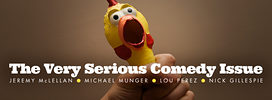I apologize for projecting a Hillary Clinton joke into Jeremy’s set at the International Students for Liberty Conference earlier this year. Whether that qualifies as “glaring sloppiness” or early-onset Alzheimer’s, I regret the error, and I rush to add that I did in fact read Jeremy’s essay (twice, in fact).
The problem is that I just don’t agree with what I take to be its central propositions, including the following:
Comedy [is] inherently subversive to any incarnation of human conceit.
As an art form, comedy is inherently anti-authoritarian.
Comedy itself is anarchist insofar as it celebrates and bears witness to a world that the state must deny in order to wield power.
To answer their calling, comedians must assert their independence and resist becoming either soothing court jesters to the powerful or propagandists for activist causes. As artists, the temptations of Leviathan are hard to resist, as are those of its opponents. But Leviathan is not a specific regime, a set of people, or even an ideology. It is the physical embodiment of the human conceit that we can understand the world perfectly, that domination can ever be successful, that rebellions can be put down forever, that an artist can truly fulfill his purpose by performing for an emperor and against his victims.
You get the idea. Jeremy may claim that he doesn’t believe creative expression generally or comedy in particular should be put into the service of a specific ideological or political agenda, so it’s obviously a lucky coincidence that he defines comedy in such a way that it could comfortably spoon with libertarianism on the narrowest of twin beds. For fuck’s sake, he might even have written that, à la Hayek, comedy is “inherently subversive to any incarnation of [the fatal] conceit” and just gone ahead and used the Austrian economist’s term for the hubris that tends to attend to power and control. Beyond his conflation of comedy and a generally libertarian sensibility—to my mind, libertarianism starts in recognizing the limits of human knowledge—I reacted negatively to the sanctimony and self-importance of lines such as this one: “Treason is baked into the job description.”
Yeah, not so much. As I think I amply documented, a lot of comedy is in no way subversive of anything, from audience expectations to “Leviathan.” Comedy doesn’t inherently do anything except try to make someone laugh. In the case of (to my mind awful) shows such as The Prairie Home Companion, it soothes audiences or makes them feel somehow superior (they’re in on the joke). That might qualify it as bad comedy or unfunny, but it doesn’t mean it doesn’t exist.
I ended my initial entry in this debate with “a glowing call for libertarian artists to subvert the status quo in a variety of ways” (Jeremy’s words!) so let me end this bit in a slightly different way. Jeremy used St. Genesius as a controlling metaphor for his essay. Genesius was the 4th-century Roman actor who, while performing in a play making fun of Christianity, found religion and was executed for his new beliefs. One way of reading that is how Jeremy does it: This is “comedy as political resistance.”
Except the metaphor kind of falls apart, doesn’t it? Genesius wasn’t killed for telling jokes; he stopped being funny in mid-performance, like Don Rickles does toward the end of Hello Dummy!
In such circumstances, no one can blame the audience for groaning at moralistic performers, though murder is indeed an overreaction. If comedy is tragedy plus time, tragedy may be when comedy starts taking itself so seriously that it stops even pretending to be entertaining. The challenge before those of us interested in creating a world that is more free, more fun, and more libertarian is to create culture—everything from standup comedy to journalism that stands up—that is engaging, provocative, and irresistible. On that much, I hope Jeremy and I can agree to disagree.

